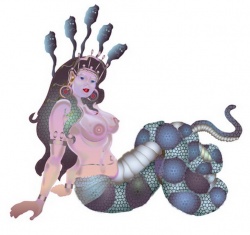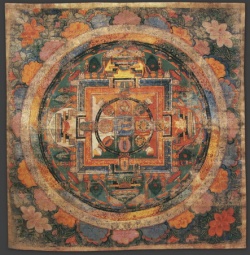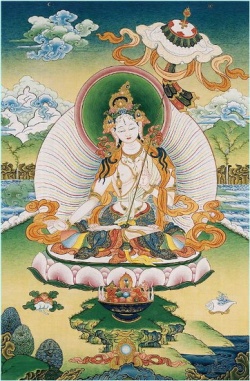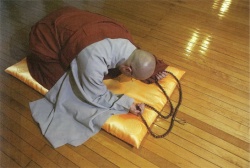The Story of Isidasi, a Buddhist Nun
In the city of Pataliputta, treasured
on earth for its glorious flowers,
there were two mendicant nuns of the Buddha's own Sakya clan.
One was Isidasi, the other was Bodhi,
both of them morally pure, skilled in meditation, wise,
and freed from painful vices.
They begged alms, ate their food,
washed their bowls,
and found a secret place to rest and share their stories.
"You're still beautiful, Isidasi.
Your youth hasn't faded.
What vision of evil drove you
to renounce the world?"
In that secret place she told her tale to teach the truth of Buddha's way.
Isidasi said to Bodhi,
"Hear why I am a mendicant nun:
In the great city of Ujjeni
my father was a merchant of high repute.
I was his only daughter,
deeply loved and pampered.
A wealthy merchant sent noblemen
from the city of Saketa
to arrange a marriage, and my father
gave me to be his son's wife.
Day and night I humbled myself
to honor my in-laws-
my training made me bow
my head down at their feet.
When I saw my husband's
sisters and brothers
I cringed and crept away
to free my seat for them.
I kept fresh-cooked food and drink
and spiced pickles ready
to serve their demands.
I woke early every morning
to scrub my hands and feet
before I crossed the threshold
to beg my husband's blessing.
Like a slave girl,
I too combs and scented oils
and my mirror to groom him.
I cooked his rice gruel,
I washed his bowl,
I waited on this husband
like a mother dotting on her son.
Though I was diligent and humble,
meticulous and virtuous
in serving him,
my husband despised me.
He begged his parents,
'Give me your leave.
I must go away. I will not stay
in this house with Isidasi!'
'Don't speak this way, son!
Isidasi! Is intelligent and wise,
diligent, meticulous.
Doesn't she please you, son!'
She does me no harm,
but I will not stay with Isidasi.
I detest her! Enough!
Give me leave, I must go away!
My husband's parents
heard his words and questioned me,
'How did you offend him?
Confide what really happened.'
'I committed no offense or harm
or ever answered his cruel words.
I don't know what I did
to make this husband hate me.'
They took me back
to my father's house.
'To keep our precious son
we sacrifice this goddess.'
Then my father married me
into another wealthy house. The second merchant took me
for half the first bride price.
I lived in that house
for barely a month,
serving him like a slave until he sent me back.
Then my father snared an ascetic
begging for alms; he said,
'Be my daughter's husband!
Throw away your robe and pot!'
He stayed for two weeks
before he told my father,
'Give me my robe and pot and cup!
I'll beg for alms again.'
My parents and my family
beseeched him,
'What have we neglected?
Quickly, name your every want!'
He answered, 'I only want enough to feed myself.
I will not stay in this house
with Isidasi!'
They dismissed him and he left.
I brooded in my solitude:
'I'll tell them I'm going to die
unless I become a mendicant nun.'
And the great nun jinadatta
came begging alms
at my father's house-she was
disciplined, wise, morally pure.
I rose when I saw her
and gave her my seat,
bowed at her feet
and offered her a meal.
I served her fresh-cooked food
and drink and spiced pickles.
When she had eaten, I said,
'Lady, I want to be a nun.'
My father argued, 'My child,
you may follow the Buddha's way
by giving food and drink to holy men and brahmin priests.'
I pleaded in tears, begging his blessing,
'I must destroy
the evil I have done!'
When I was sixteen
the son of this merchant
noticed my maiden youth
and took me.
He had another wife
who was moral and virtuous,
in love with her husband.
I sowed discord with her.
The fruit of seven former lives
made three husbands scorn me,
though I served them like a slave-
I have ended all this now.
Source:Rielly, Kevin. Readings in World Civilizations, Volume One:The Great Traditions. New York: St. Martins Press. 1995,p. 144-14





